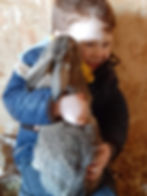Yew Tree Farm School sessions are run by qualified teachers and can incorporate many areas of the national curriculum. Students are able to cover topics that are ordinarily taught in schools so time spent on the farm is not time that needs to be made up elsewhere. However, the benefits are far greater than just academic success.

Working alongside animals is hugely beneficial for children and young people. Animals have a positive impact on self-esteem, empathy, engagement and behaviour. Through caring for the animals, students learn to put others’ needs before their own. This is a hugely valuable skill and one that can be especially difficult for some children. Learners begin to understand that they are responsible for the animals, increasing their self-esteem as they become able to independently care for them. Empathy towards the animals develops and in turn the ability to empathise with other people emerges too. By returning to Yew Tree Farm School on multiple occasions children start to be aware of their emotions and improve their emotional self-regulation, in order to remain calm whilst working with the animals. Overall these improvements lead to a change in behaviour, including a reduction in inattention and impulsivity, which has an enormous impact on the children’s ability to learn and most importantly their happiness.

Furthermore, outdoor learning and access to nature offer a huge advantage to all learners. By working on the farm children improve their physical health, but also their mental health. Access to greenspace increases self-esteem and an improvement can be seen in students’ interpersonal skills and school performance. Children are much more likely to recall a lesson they learnt whilst outside of the classroom in an interesting and engaging environment. By associating the curriculum content with the farm, learners are better able to remember and apply the information when back in the classroom. Sessions at Yew Tree Farm School offer the potential for children to strengthen friendships and form new ones by working alongside different peers to those they work with at school. The focus is always on team work and many tasks on the farm require collaboration and on task communication as they cannot be completed independently. Participation is actively encouraged but never forced. We understand children take time to become comfortable in an environment and ensure we go at a pace that is most beneficial for them.
But don’t just take our word for it! There have been many studies looking at the importance of outdoor learning and the immensely positive impact working with animals has on children and young people. The following articles and books are an excellent starting point for research into the topic, or give us a call to discuss further, we are very passionate about the subject so always happy to chat!
Daly, B et al. (2010). Teachers' experiences with humane education and animals in the elementary classroom: implications for empathy development. Journal of Moral Education. 39 (1), p101-112.
Dillon, J et al. (2006). The value of outdoor learning: evidence from research in the UK and elsewhere. School Science Review. 87 (320), p107-111.
Endenburg, N et al. (2011). The influence of animals on the development of children. The Veterinary Journal. 190 (2), p208-214.
Fägerstam, E. (2012). Space and Place: Perspectives on outdoor teaching and learning. In: Linköping Studies in Behavioural Science. Linköping: Linköping University Electronic Press. p100.
Sprinkle, J. (2008). Animals, Empathy, and Violence: Can Animals Be Used to Convey Principles of Prosocial Behavior to Children?. Youth Violence and Juvenile Justice. 6 (1), p47-58.
Taylor, A et al. (2006). Is contact with nature important for healthy child development? State of the evidence. In: Spencer, C et al Children and Their Environments: Learning, Using and Designing Spaces. Cambridge: Cambridge University Press. p124-140.
